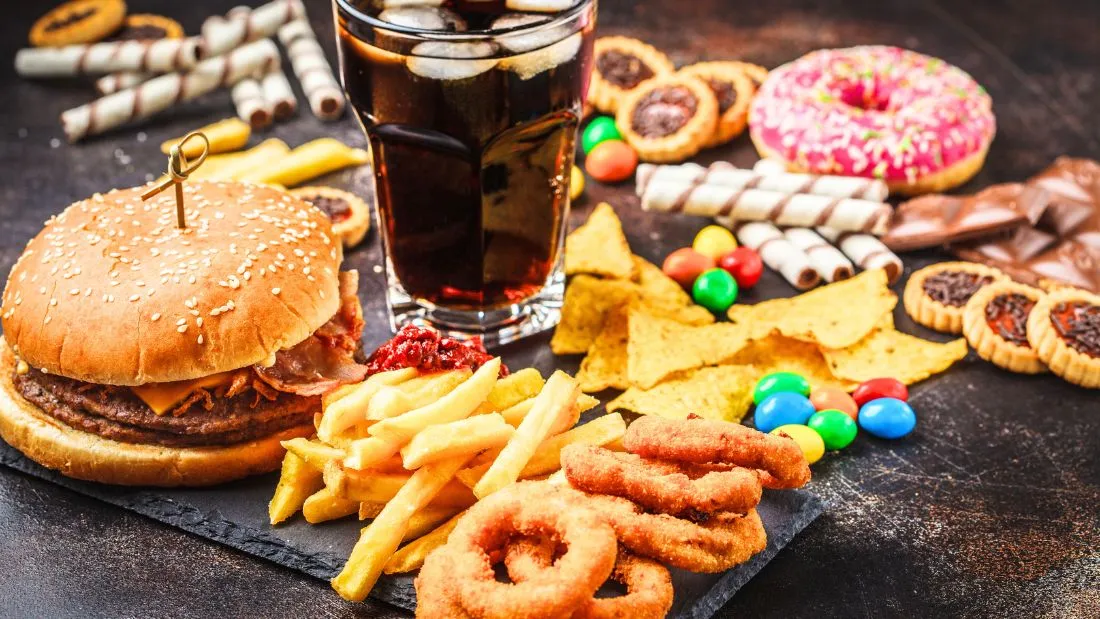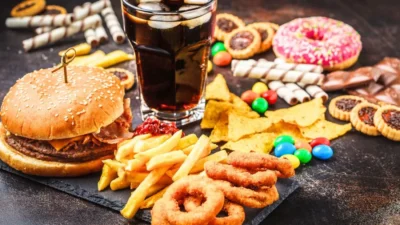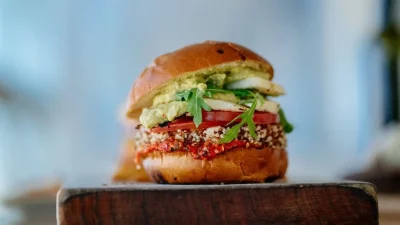Ultra-processed foods – what you need to know

Ultra-processed food (UPF) is the latest buzzword in nutrition. A simple definition is, packaged food containing ingredients you don’t have in your kitchen. Most UPFs are produced in factories using ingredients created by food technologists, such as emulsifiers, thickeners, modified starches, colours and flavouring. UPFs tend to be high in fat, salt and sugar and have a long shelf life having been engineered to be convenient, highly palatable and highly profitable. They can be so processed that they don’t even look like food – think of pink pork slices with a bear’s face or blue breakfast cereal loops!
Typical examples of UPFs include hot dogs, sausages, chicken nuggets and other reconstituted meat products, ready meals, breakfast cereals, crisps, chocolate, biscuits, ice-cream, fruit yoghurts and fizzy drinks. The UK’s best-selling UPFs include Mr Kipling cakes, Batchelors Super Noodles and cup-a-soups, McVitie’s biscuits, Kellogg’s breakfast cereals, Cadbury’s chocolate and Haribo sweets.
Diets high in UPFs have been found to increase the risk of high blood pressure, heart disease, stroke, obesity, type 2 diabetes, breast and bowel cancer and have recently been linked to faster biological aging – hence the concern about these ‘unnatural’ foods.
However, most foods are processed to some extent so even when you cook at home from scratch, the flour, pasta, olive oil or tinned tomatoes you might use are not in their natural state, they have been processed – albeit minimally. But even when a food is deemed ultra-processed, it doesn’t automatically mean it’s unhealthy. Marmite, packaged wholemeal bread and soya milk, for example, are UPFs, as is infant formula.
On the other hand, some natural foods can be harmful; dried kidney beans contain natural toxins called lectins, which can cause stomach ache and vomiting if not cooked properly. Natural toxins called glycoalkaloids found in green potatoes can cause acute nausea, vomiting and diarrhoea. Too much vitamin A from eating liver can damage a developing foetus and let’s not forget, animal foods are the main cause of food poisoning.
The term UPF originates from the NOVA classification system, devised in 2009 by researchers in Brazil. It divides foods into four groups, based on their degree of processing: unprocessed or minimally processed foods, processed culinary ingredients, processed foods and UPFs. The NOVA system is used worldwide in nutrition and public health research, policy and guidance. However, there is substantial criticism of it and food scientists have highlighted inconsistencies. So, are all UPFs equally bad and do vegan UPFs offer any health benefits?

10 myths about vegan UPFs
1) Vegans eat mainly UPFs
False: UPF is a very broad term that captures many food groups and contrary to press headlines, vegan diets are no more processed than other diets. Plant-based meats are only a small part of a much bigger picture. According to a study from 19 European countries, UK families buy more UPFs than any others in Europe, amounting to over 50 per cent of the nation’s diet. The greatest contributor is not meat alternatives but bread, pastries, buns, cakes, biscuits, crisps and soft drinks. Unless you eat an unhealthy vegan diet based on packaged foods, you will be eating fruit, vegetables, pulses, wholegrain foods, nuts and seeds – none of which are UPFs. So, eating too many UPFs is a national, not a vegan, problem!
2) All processed foods are UPFs
False: Processing includes a wide range of methods such as freezing, bottling or drying. Tinned beans, frozen fruit and vegetables, dried fruit and toasted nuts are all processed but can still form part of a healthy vegan diet.
3) Eating even a small amount of UPFs is harmful
False: The impact of UPFs on your health depends on the overall quality of your diet and lifestyle. Living mainly on UPFs will likely, over time, increase your risk of illness and disease but if most of your diet is based on healthy foods, the occasional biscuit, chocolate, salty snack or vegan sausage is unlikely to cause problems.
4) All vegan meat alternatives are UPFs
False: Vegan alternatives to meat such as nuts, mushrooms, jackfruit, beans, tempeh and tofu are not UPFs. However, most commercial vegan burgers, sausages, bacon etc are. That said, many companies are shifting their focus to improve the health credentials of their meat-free products. Convincing people of this will be an uphill battle, not helped by misleading Government-backed campaigns promoting meat and dairy.
5) ‘Real’ meat is healthier than vegan meat alternatives
False: Not all vegan meat alternatives are UPFs but even those that are, are still preferable to their meaty equivalents. Bacon and ham are considered ‘processed’ because they’ve been preserved using methods such as smoking, curing, salting or adding preservatives but haven’t been reconstituted, whereas hot dogs and sausages are UPFs because they are even more significantly altered from their natural state. However, all types of processed meat are classed by the World Health Organisation as Group 1 carcinogens – meaning they cause cancer! The World Cancer Research Fund recommends limiting both processed and red meats (beef, pork and lamb) because of their links with bowel cancer.
6) Vegan UPFs lack nutrients
Most vegan meat alternatives contain a similar amount of protein to their meaty equivalents but less fat – especially unhealthy saturated fat – and no cholesterol. They contain bowel-protecting fibre – meat has none. Some have added vitamin B12 which, by the way, is not a ‘natural’ component of meat as farmed animals are given B12 supplements. You’re better off taking your own supplement and avoiding the meat.
7) Producing vegan UPFs is bad for the environment
False: Vegan foods – including UPFs – have a significantly lower environmental impact than processed or unprocessed animal foods. They produce less greenhouse gases and require less land and water while avoiding the misery of factory farming – which poses a pandemic threat and increases the risk of antibiotic-resistant superbugs. That said, watch out for ingredients like palm oil which contributes to deforestation and habitat destruction. It’s the most widely consumed vegetable oil on the planet and is found in half of all packaged products, from ice-cream and instant noodles to shampoo and lipstick.
8) Labels make it easy to identify UPFs
False: Identifying UPFs isn’t always easy as many are marketed as ‘healthy’ or ‘natural’ and it can be difficult to work out the extent of processing. Look for long lists of ingredients, including things you don’t recognise such as thickeners, stabilisers and emulsifiers.
9) All vegan UPFs are bad for your health
False: While vegan burgers and sausages can’t be described as healthy, some have better ingredients than others. Emerging evidence has shown some positive outcomes for plant-based meat alternatives. One study, looking at vegan mince, burgers, sausages and meatballs from the Meatless Farm company compared them with red meat, poultry, fish, eggs and cheese. After just four weeks, only those eating the plant-based foods showed beneficial changes in their gut bacteria that may confer significant and wide-ranging health benefits.
10) Vegan meat alternative UPFs are just for vegans
False: We’ve enjoyed a huge wave of new vegan products but many of these serve as ‘transition’ foods, for those moving away from animal foods, or as alternatives for the millions of flexitarians reducing their meat intake.
Understanding these myths can help you make more informed choices about UPFs, allowing you to enjoy food options without misinterpreting their risks or benefits. For a balanced vegan diet, focus on a variety of whole plant foods with minimal processing.






